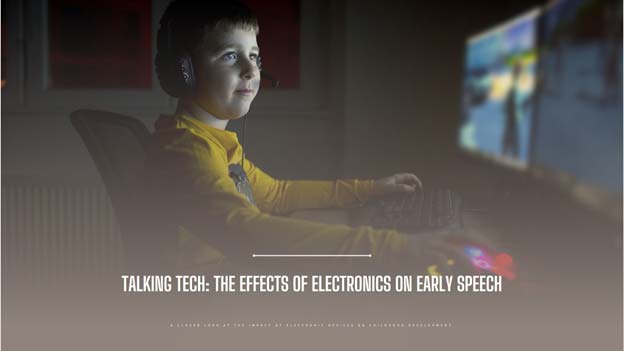Dr. Tarek El Baba
Abstract
Integrating electronic devices in the context of daily life has greatly transformed the early life experience and generated worries regarding its impacts on a child's development. These (smartphone, tablet, and digital) devices affect different developmental domains, such as speech development. This study investigates the effects of electronic devices on the development of language in young children and examines positive as well as negative effects. Using a selection of studies and examples, the article explores the impact of screen time on speech, cognitive growth, and socioemotional development in children. Guidelines for healthily controlling electronic device use are also presented.
Introduction
Electronic devices are now ubiquitous in children's lives in today's society, influencing their learning, and play from a very early period. Although these devices are commonly thought of as entertainment/educational tools, there is urgent concern as to how they may be affecting early childhood development. The importance of this area of growth in these formative years means speech development is particularly susceptible to the impact of screen time. This paper discusses the impact of electric devices on the speech development of early children, identifying the possible risks, and providing suggestions for preventing these adverse effects.
Theoretical Background
Language acquisition is at the core of a child's cognitive, social, emotional, and physical development. Theories of language learning such as Vygotsky's socio-cultural theory and Chomsky's Universal Grammar theory stress the role played by social interaction in learning. Vygotsky (1978) emphasized that learning languages are best achieved using direct oral communication with adult caretakers and fellow students, whereas Chomsky (1965) proposed that children acquire a natural ability for language acquisition and need sufficient linguistic input for their development. As electronic devices often provide limited interaction, excessive use can disrupt these critical learning processes.
Positive Impact of Electronic Devices on Speech Development
Although excessive use of electronic devices can have an undesirable effect on speech development, there is evidence of digital tools that can aid language learning when used effectively. For instance, educational apps, including Endless Alphabet, WordWorld, and Starfall, have been created to facilitate children's vocabulary and phonemic awareness development. These apps commonly lead to children repeating words, matching sounds to letters, and interacting with multiple media, which facilitate verbal communication.
Neumann (2018) has shown that in the case of repeated exposure to educational information children aged between 3-5 years experienced increases in vocabulary and pronunciation. In one example, a group of preschool children interacted with a digital storybook app that required them to identify words, repeat sentences, and engage with animated characters. After six weeks of use, their language skills improved significantly compared to the control group. This indicates that, when considered thoughtfully, digital tools should be able to augment the development of the usual learning skills.
Difficulties in Language Development Due to Excessive Screen Time
Although there are advantages, excess screen time can lead to various adverse effects on speech and language development. Research consistently shows that children who spend more than two hours per day using passive media, such as watching television or videos, may experience delays in speech development. Studies such as those by Zimmerman et al. (2007) have reported that passive screen time restricts verbalization, the crucial communication mechanism whereby children can hone their pronunciation, vocabulary, and conversation.
For example, Christakis et al. (2009) conducted a study on children aged 2-3, finding that those who watched more than two hours of television per day had smaller vocabularies and less advanced speech skills than children who spent more time interacting verbally with caregivers and peers. The absence of two-way communication during passive screen time prohibits children from having meaningful dyadic verbal interactions vital for language acquisition.
Impact on Cognitive Development
Excessive screen time also hinders cognitive development in young children. In early childhood, children acquire essential skills in their problem-solving, memory, and logical thinking. Nevertheless, extended use of digital media, and in particular passive media content, leads to a decrease in the amount of time that is available for the activity of exercising cognitive functions. As noted by Rosen et al. (2014), children who use digital devices excessively struggle with attention and focus, which impedes their ability to engage in tasks that require sustained concentration.
In a single study children with consistent digital media exposure showed lower levels of cognitive control and greater impulsivity. They found it harder to remember instructions and follow multi-step directions, both of which are vital skills for language learning. In the counterpart, if a child is used to engaging with passive content (e.g., television) for extended periods, it could be difficult to sustain attention and cognitive effort during an interactive classroom lesson.
Social and Emotional Development
The impact of high screen time also carries over to the realm of social and emotional development. Early childhood is a development stage that is particularly important for learning both social and emotional skills, such as empathy, emotional regulation, and communication competencies. If children overeat electronic devices, especially in solitude, they lack opportunities to peer into the deep social interactions crucial to the acquisition of skills.
Zimmerman et al. (2007) reported that children playing with electronic devices for a prolonged time possessed fewer social interactions with caregivers and peers. For example, one case study involved a 4-year-old child who spent several hours each day watching television. As time passed, the child showed signs of social isolation, as well as difficulty socializing with peers in play. This behavior change was correlated to the absence of direct bilateral communication, whose role in the SNS is pivotal for the maturation of social and emotional intelligence.
Examples of Speech Delays Linked to Electronic Device Use
Real-world cases highlight the detriments of high screen time on speech development. A study by Ginsburg (2007) followed preschoolers who had daily access to digital devices. While some children demonstrated slight improvements in vocabulary due to educational apps, others exhibited delays in expressive and receptive language. One child, who spent much of the day watching cartoons, had limited verbal communication skills and struggled to respond to basic questions.
Speech delay was assigned to a lack thereof verbal interaction. In contrast, children who engaged in more face-to-face conversations with caregivers showed greater proficiency in both receptive and expressive language skills. This illustrates the role that verbal transaction plays in the development of language.
Cognitive and Social Implications of Overuse
Exceeding speech learning other modalities, overuse of electronic devices has broader cognitive and social significance. Excessive screen time, as has been reported by the American Academy of Pediatrics (2016), has been associated with poor sleep quality that, subsequently, affects cognition and emotion regulation. Insufficient sleep can be preceded by irritability, impaired concentration, and impaired learning. These effects are particularly difficult to overcome in the development of speech and language abilities in children.
For instance, a child who frequently stays up late due to screen exposure may find it challenging to focus during lessons the following day. This deficit in attention span leads to difficulty in linguistic processing and memory, which in turn delays speech acquisition.
Recommendations for Parents and Educators
For parents and educators to reduce the adverse consequences of electronic devices, parents and educators must develop strategies to moderate screen time and supplement it with interactive, engaging activities. The American Academy of Pediatrics (2016) recommends that children aged 2 to 5 should be limited to no more than one hour of screen time per day. This screen time should be used for educational content that encourages language learning (e.g., interactive apps or educational videos).
Moreover, parents are encouraged to also actively participate with children whilst they are engaged with screen time, offering them a chance for communication by voice and supporting the development of their language skills. For instance, watching an educational video, and discussing it, can facilitate children's learning of novel vocabulary and the development of their comprehension abilities.
In the classroom, the classroom teacher can leverage digital tools in such a way as to stimulate active participation. For instance, digital storytelling apps can be used to help children produce their own stories and narrate them, promoting language and creativity.
Conclusion
Although electronic devices may provide some educational value, they can also interfere with speech acquisition and other early childhood growth processes by overuse. Cognitive and social development, such as language acquisition, are heavily influenced by the screen time that children spend on digital media. Through the combined use of screen time moderation and interactive play, talking, and other cognitively stimulating activities, parents and educators can contribute to the realization that electronic toys can act as tools to supplement and not form a substitute for a child's speech acquisition.
References
American Academy of Pediatrics. (2016). Media and children. Pediatrics, 138(5), e20162591.
Christakis, D. A., Zimmerman, F. J., DiGiuseppe, D. L. (2009). Early television exposure and subsequent attentional problems in children. Pediatrics, 123(2), 640-645.
Ginsburg, K. R. (2007). The role of play in healthy child development and in supporting positive parent-child relationships. Pediatrics, 119(1), 182-191.
Neumann, M. M. (2018). The impact of technology on children’s early literacy development. Early Childhood Education Journal, 46(3), 235-242.
Media-induced task-switching while studying. Computers in Human Behavior, 31, 58-63.
Snow, C. E. (2010). Academic language and the task of reading to learn science. Science, 328(5977), 450-452.
Zimmerman, F. J., & Christakis, D. A. (2007). Effects of fast-food branding on young children's taste preferences. Archives of Pediatric & Adolescent Medicine, 161(5), 437-441.
تأثير الأجهزة الإلكترونية على تطور الكلام لدى الأطفال في مرحلة الطفولة المبكرة
د. طارق البابا
الملخص
أدت دمج الأجهزة الإلكترونية في حياتنا اليومية إلى تغيير كبير في تجربة الحياة المبكرة وأثار قلقًا بشأن تأثيراتها على نمو الطفل. تؤثر هذه الأجهزة (مثل الهواتف الذكية، والأجهزة اللوحية، والأجهزة الرقمية) على مجالات نمو متعددة، بما في ذلك تطور الكلام. تستكشف هذه الدراسة آثار الأجهزة الإلكترونية على تطور اللغة لدى الأطفال الصغار، وتبحث في الجوانب الإيجابية والسلبية لهذه الأجهزة. ومن خلال استعراض دراسات وأمثلة مختارة، يناقش المقال تأثير وقت الشاشة على الكلام والنمو المعرفي والاجتماعي والعاطفي للأطفال. كما يتم تقديم إرشادات للتحكم الصحي في استخدام الأجهزة الإلكترونية.
المقدمة
أصبحت الأجهزة الإلكترونية جزءًا لا يتجزأ من حياة الأطفال في المجتمع الحديث، مؤثرة على تعلمهم ولعبهم منذ سن مبكرة. ورغم أن هذه الأجهزة تُعتبر عادة أدوات تعليمية وترفيهية، إلا أن هناك قلقًا متزايدًا بشأن تأثيرها على نمو الأطفال في مرحلة الطفولة المبكرة. نظرًا لأهمية هذه المرحلة العمرية في التطور، يُعتبر تطور الكلام معرضًا بشكل خاص لتأثير وقت الشاشة. يناقش هذا البحث تأثير الأجهزة الإلكترونية على تطور الكلام لدى الأطفال في مرحلة الطفولة المبكرة، مع تسليط الضوء على المخاطر المحتملة وتقديم توصيات للحد من هذه التأثيرات السلبية.
الخلفية النظرية
يعد اكتساب اللغة جزءًا أساسيًا من التطور المعرفي والاجتماعي والعاطفي والجسدي للطفل. تؤكد نظريات تعلم اللغة مثل نظرية "فيجوتسكي" الاجتماعية-الثقافية ونظرية "تشومسكي" للقواعد النحوية العالمية على دور التفاعل الاجتماعي في التعلم. أوضح "فيجوتسكي" (1978) أن تعلم اللغات يتحقق بشكل أفضل من خلال الاتصال المباشر مع مقدمي الرعاية والكبار، بينما اقترح "تشومسكي" (1965) أن الأطفال يمتلكون قدرة فطرية لاكتساب اللغة، ولكنهم بحاجة إلى مدخلات لغوية كافية لتطويرها. ونظرًا لأن الأجهزة الإلكترونية تقدم تفاعلاً محدودًا، فإن الاستخدام المفرط قد يعطل هذه العمليات الحيوية للتعلم.
التأثيرات الإيجابية للأجهزة الإلكترونية على تطور الكلام
رغم أن الاستخدام المفرط للأجهزة الإلكترونية قد يؤثر سلبًا على تطور الكلام، إلا أن هناك أدلة تشير إلى أن الأدوات الرقمية يمكن أن تُساهم في تعلم اللغة إذا ما استُخدمت بشكل فعال. على سبيل المثال، تم تطوير تطبيقات تعليمية مثل Endless Alphabet وWordWorld وStarfall لتعزيز مفردات الأطفال وتطوير وعيهم الصوتي. تساعد هذه التطبيقات الأطفال على تكرار الكلمات، وربط الأصوات بالحروف، والتفاعل مع وسائط متعددة مما يُعزز التواصل اللفظي.
أظهرت دراسة لـ "نيومان" (2018) أن التعرض المتكرر للمعلومات التعليمية أدى إلى تحسين مفردات الأطفال ونطقهم. فعلى سبيل المثال، تفاعل مجموعة من الأطفال في سن ما قبل المدرسة مع تطبيق كتاب قصصي رقمي تطلب منهم التعرف على الكلمات، وتكرار الجمل، والتفاعل مع شخصيات متحركة. وبعد ستة أسابيع، أظهرت نتائجهم تحسنًا كبيرًا مقارنة بالمجموعة الضابطة. تشير هذه النتائج إلى أن الاستخدام المدروس للأدوات الرقمية يمكن أن يُعزز تطوير المهارات اللغوية.
صعوبات في تطور اللغة بسبب وقت الشاشة الزائد
بالرغم من الفوائد المذكورة، يمكن أن يؤدي وقت الشاشة المفرط إلى تأثيرات سلبية على تطور اللغة. تظهر الأبحاث أن الأطفال الذين يقضون أكثر من ساعتين يوميًا في استخدام الوسائط السلبية (مثل مشاهدة التلفاز أو الفيديوهات) قد يواجهون تأخيرات في تطور الكلام. تشير دراسات مثل "زيمرمان" وآخرين (2007) إلى أن وقت الشاشة السلبي يحد من التفاعل اللفظي، وهو آلية تواصل ضرورية لتحسين النطق والمفردات والمحادثة.
على سبيل المثال، أجرى "كريستاكيس" وآخرون (2009) دراسة على أطفال تتراوح أعمارهم بين 2-3 سنوات، ووجدوا أن الأطفال الذين شاهدوا التلفاز لأكثر من ساعتين يوميًا كان لديهم مفردات أقل ومهارات كلامية أضعف مقارنة بأقرانهم الذين قضوا وقتًا أطول في التفاعل اللفظي مع مقدمي الرعاية والأقران. يمنع غياب التواصل ثنائي الاتجاه أثناء وقت الشاشة السلبي الأطفال من خوض تفاعلات لفظية ضرورية لاكتساب اللغة.
التأثير على التطور المعرفي والاجتماعي
يتجاوز تأثير الأجهزة الإلكترونية مجرد اكتساب اللغة إلى مجالات النمو المعرفي والاجتماعي. أشارت الأكاديمية الأمريكية لطب الأطفال (2016) إلى أن الاستخدام المفرط للأجهزة مرتبط بنوعية نوم رديئة، ما يؤثر بدوره على التنظيم العاطفي والإدراك. من الأمثلة، يمكن لطفل اعتاد على التعرض للمحتوى السلبي أن يجد صعوبة في التركيز في دروسه.
التوصيات
1. للآباء: يُنصح بتحديد وقت الشاشة للأطفال بعمر 2-5 سنوات ليكون أقل من ساعة يوميًا مع محتوى تعليمي، والتفاعل معهم أثناء استخدام هذه الوسائط.
2. للمعلمين: استخدام تطبيقات مثل القصص الرقمية لتحفيز اللغة والإبداع.
الخاتمة
يمكن للأجهزة الإلكترونية تقديم قيمة تعليمية إذا استُخدمت بعناية، لكنها قد تعيق تطور الكلام واللغة إذا أُسيء استخدامها. يعد التوازن بين وقت الشاشة والأنشطة التفاعلية أمرًا حاسمًا لضمان أن تكون الأجهزة أدوات مكملة وليست بديلاً للنمو الطبيعي للطفل.





















